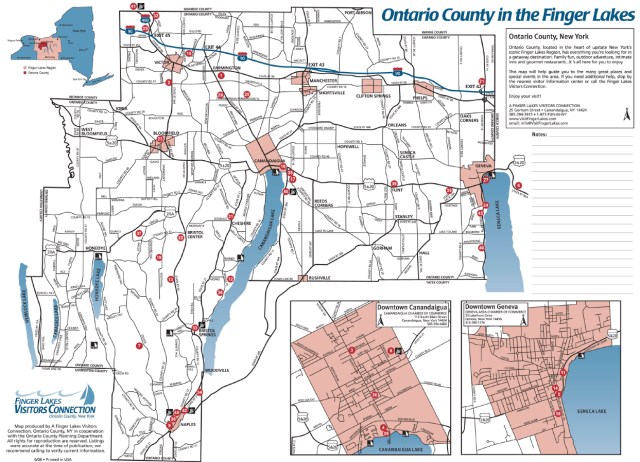 Ontario County, N.Y. has completed its 200-plus mile fiber ring and is now open for business… at least for area businesses that want commercial accounts.
Ontario County, N.Y. has completed its 200-plus mile fiber ring and is now open for business… at least for area businesses that want commercial accounts.
But the county’s Office of Economic Development has no intention of building a 21st century fiber network that consumers can’t use — it wants fiber-to-the-home service for every resident.
The formerly rural Finger Lakes county has become an economic growth spot in western New York, with urban sprawl from nearby Rochester and new high-technology businesses attracted by the area’s relatively low taxes and pro-technology attitude.
The high tech fiber ring is the most recent example of the county’s growth-oriented philosophy.
Axcess Ontario, a public-benefit corporation established to oversee the project, built the ring well under its $7.5 million budget. In the end, the whole project ended up costing just $5.5 million.
The project benefited from faster than expected contracting work and the installation of a natural gas pipeline, through which some of the county’s fiber travels. Much of the rest is attached to utility poles that stretch across the county’s rural farmlands and small cities, towns and villages.
Now complete, the project is capable of delivering ultra-fast service from cities like Geneva and Canandaigua to the wine-growing region of Naples, to the outer ring towns like West Bloomfield, Victor, Manchester, and Phelps.

Ontario County, N.Y.
“Our mission from the outset was to ensure that every community in Ontario County had access to fiber, no matter how remote that community might be, geographically speaking,” said Geoff Astles, chairman of Axcess Ontario’s board of directors. “We’re proud to say that not only have we accomplished that piece, but we’ve done it under budget.”
 The county says the network is open to all-comers, and eight companies are currently using the network themselves or reselling access to commercial businesses that need the capacity fiber brings. Among them — Verizon Wireless; TW Telecom; Finger Lakes Technologies Group and its sister company, Ontario Telephone Co.; WavHost; Clarity Connect; OneStream Networks; Layer 8; and Integrated Systems.
The county says the network is open to all-comers, and eight companies are currently using the network themselves or reselling access to commercial businesses that need the capacity fiber brings. Among them — Verizon Wireless; TW Telecom; Finger Lakes Technologies Group and its sister company, Ontario Telephone Co.; WavHost; Clarity Connect; OneStream Networks; Layer 8; and Integrated Systems.
But nothing prevents a residential service provider from hopping on board, if they’re interested in providing wiring from the fiber ring to individual homes.
“We’re working with several service providers who now have plans to bring fiber to each individual residence,” Michael Manikowski of Ontario County’s Office of Economic Development says. “That’s a little bit down the road. It’s a fairly complicated technical thing that we have to attract other partners to come to the county to help us.”
“The concept of ‘fiber to the home’ is the ultimate game-changer,” said Axcess Ontario CEO Ed Hemminger. “Once residents have fiber to the home, everything changes. Someone who wants to work from home or start a home-based business can do so with ease. Not only will they have instant access to the online global marketplace, but they’ll also have confidence that their home-based Internet connection will be as fast, as reliable and as competitively priced as any office-based system. Imagine conducting videoconferences on your iPad with business partners halfway across the world, all from your living room or your back deck.”
“This project is going to make a difference in the lives of residents and business-owners for the next 25 years,” he said.
 Among those reportedly interested: Frontier Communications, which runs limited fiber to some of the county’s new housing developments, but currently does not leverage that technology to deliver broadband faster than traditional DSL accounts the company sells elsewhere in the region. Time Warner Cable also covers the more populated areas of county through its Rochester/Finger Lakes division.
Among those reportedly interested: Frontier Communications, which runs limited fiber to some of the county’s new housing developments, but currently does not leverage that technology to deliver broadband faster than traditional DSL accounts the company sells elsewhere in the region. Time Warner Cable also covers the more populated areas of county through its Rochester/Finger Lakes division.
Individual communities inside the county could also decide to build their own community fiber service for residents, if they are willing to wire individual homes.
Residential fiber service has rarely attracted commercial service providers, convinced the technology is overkill for most consumers. Some also balk at the capital costs, which are considerably higher than existing copper phone wire or running coaxial cable to homes for traditional cable service. But many communities suffering from very low speed DSL service and not well served by cable-TV find doing it themselves can deliver service that commercial companies may never provide. Without the immediate need for quick returns on investment, towns and villages clamoring for faster broadband can finally have it, without the expense of building and running their own fiber ring.
 Axcess Ontario threatens to deliver service better and faster than what is on offer further north in much larger Monroe County, which includes Rochester. That’s because Ontario County’s advanced fiber network could ultimately scrap Frontier’s obsolete copper wire landlines and call out the incremental, slow upgrades from Time Warner Cable.
Axcess Ontario threatens to deliver service better and faster than what is on offer further north in much larger Monroe County, which includes Rochester. That’s because Ontario County’s advanced fiber network could ultimately scrap Frontier’s obsolete copper wire landlines and call out the incremental, slow upgrades from Time Warner Cable.
The Ontario County fiber ring is a nationally recognized broadband model. Harvard University’s Ash Center for Democratic Governance and Innovation at the John F. Kennedy School of Government this fall recognized the fiber ring as a “Bright Idea” — a promising, innovative solution that can assist other communities as they face their own challenges. And earlier this year, county officials met with the Federal Communications Commission in Washington, D.C., to educate FCC officials about the fiber ring and how it can be implemented elsewhere in the country.
[flv width=”480″ height=”380″]http://www.phillipdampier.com/video/WHAM Fiber Ring in Ontario County 12-29-10.flv[/flv]
WHAM-TV in Rochester reports Ontario County’s new community-owned fiber ring could eventually deliver fiber to the home service to every resident in the county. (2 minutes)


 Subscribe
Subscribe










